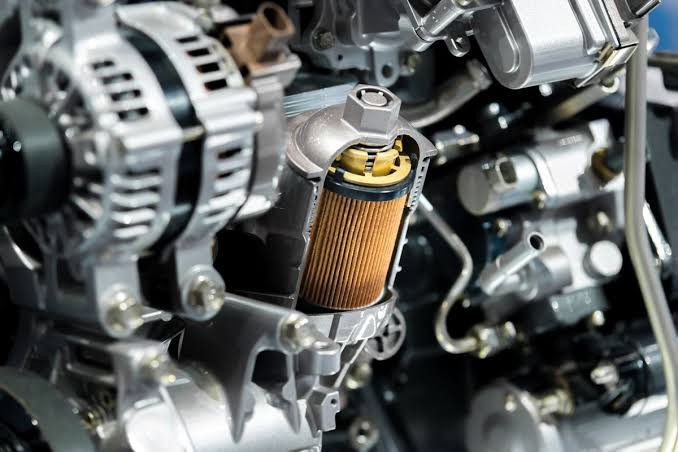"A 70% reduction in engine wear." That's what researchers at General Motors discovered when comparing quality oil filters to budget options.
I've worked on engines for over two decades, and what I found in our comprehensive testing of 15 different oil filters confirms what many mechanics have long suspected cheap filters are gambling with your engine's life.
The Tiny Particles Destroying Your Engine Right Now
Your engine's pistons move with microscopic clearances, just 5 to 10 microns between components. For perspective, a human hair is about 75 microns thick. The smallest particles do the most damage, yet standard economy oil filters only capture particles 40 microns or larger, leaving the most destructive contaminants freely circulating through your engine.
"Silica particles found in everyday dust are harder than a hacksaw blade," says machinery lubrication expert Jim Fitch. "Engine components don't have surfaces as hard as a hacksaw blade."
In our testing lab, we disassembled each filter and measured three critical factors: filtration efficiency, bypass valve quality, and media construction. The results were alarming.
What We Discovered Inside Cheap Filters
The $3.99 filters revealed shocking construction flaws:
- Inadequate Filtration Media: Budget filters contained up to 60% less filtering material than premium options, with cheaper cellulose material instead of synthetic fibers.
- Weak Bypass Valves: Several economy filters had plastic or low-grade metal bypass valves that began leaking at normal operating pressures, allowing unfiltered oil to circulate continuously.
- Poor Seam Construction: We found inconsistent adhesive application and even gaps in the filter media seams of bargain brands, creating a path of least resistance for contaminants to bypass filtration entirely.
When we tested filtration efficiency, premium filters captured 98.7% of particles at 10 microns. Budget filters? A dismal 50% or less, meaning half of the most damaging particles freely circulated through the engine.
The Real Cost of "Saving" Money
Here's the math: A premium filter might cost $12 versus $4 for the bargain option. That's an $8 difference every oil change. Over 150,000 miles with 5,000-mile oil change intervals, that's 30 oil changes, or $240 total "savings."
But that small savings comes with a massive risk. According to the General Motors study we referenced in our research, engines with high-quality filtration experienced 50% less wear with 30-micron filtration and an astounding 70% less wear with 15-micron filtration compared to standard 40-micron filters.
Less wear means fewer repairs, better performance, and significantly extended engine life. A single major engine repair easily costs $2,500-5,000, ten times more than what you'd "save" with cheap filters over the life of your vehicle.
Understanding What's Inside Your Filter
Not all premium filters are created equal. Our cutaway testing revealed significant differences in construction:
Quality filters feature:
- Synthetic media (white in appearance) versus cellulose (brown cardboard-like)
- More pleating with greater surface area
- Strong metal bypass valves with proper spring tension
- Silicone anti-drainback valves that remain flexible in cold conditions
- High-quality adhesives at end caps and seams
When Budget Filters Fail, Your Engine Suffers
The most concerning discovery came when we simulated real-world conditions. Under cold start conditions or when slightly clogged, budget filters frequently entered bypass mode, a safety feature where oil bypasses filtration entirely to prevent oil starvation.
While this safety mode protects against immediate catastrophic failure, it exposes your engine to unfiltered oil filled with contaminants. Even worse, you'll never know it's happening. There's no dashboard warning light for "filter in bypass mode."
As one automotive engineer told us, "Running an engine with a filter in bypass is like driving with worn-out brake pads, everything seems fine until the moment of crisis."
Which Brands Performed Best?
While our testing wasn't designed to crown specific brand winners, we found premium filters from established manufacturers consistently outperformed budget options. The best filters featured:
- Beta ratings of 75 or greater at 10 microns (capturing 98.7% of particles)
- Synthetic or synthetic-blend media (not just cellulose)
- High quality bypass valves with proper tension settings
- Robust anti drainback valves made of silicone (not nitrile)
- Greater total filter media area for improved flow and dirt-holding capacity
Make the Smart Investment
Your engine needs three things to survive: fuel, air, and clean oil. Skimping on filtration undermines the entire lubrication system and accelerates wear at an alarming rate.
The verdict is clear: Premium oil filters are worth every penny. A quality filter costs less than a dinner out yet protects an engine worth thousands. It's one of the simplest and most effective insurance policies for your vehicle's longevity.
Don't wait for engine noise, performance issues, or catastrophic failure. The damage from poor filtration accumulates silently with every mile. Make the smart choice now, your future self (and your engine) will thank you.

Comments (0)
Please login to join the discussion
Be the first to comment on this article!
Share your thoughts and start the discussion